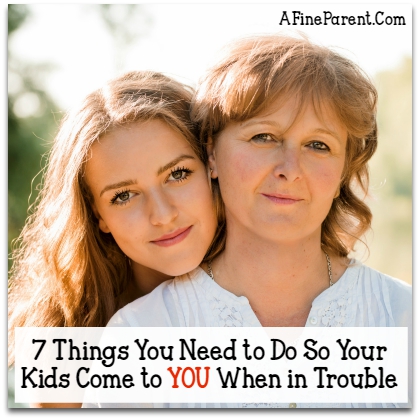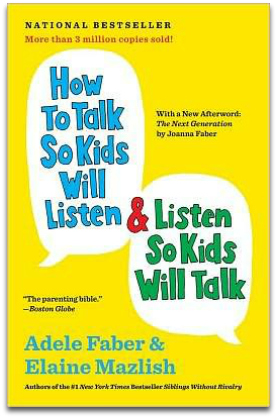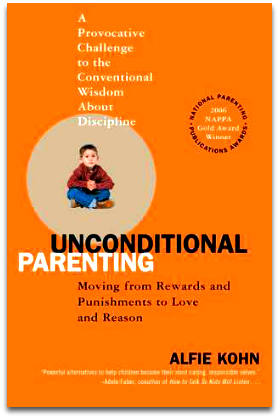Source Taken from here





Right now, your child trusts you. You are the source of all good things. She knows if she hurts herself or is hungry or needs information, she can ask you for help.

But how can you make sure your young child grows into someone who will continue to come toyou when life gets seriously difficult?
In the middle of a divorce and losing my job, the last people I wanted to speak with were my parents. They are the people who care for me more than anyone else in the world and who would probably give their lives to save mine. And yet, my parents were unavailable to me simply because I was afraid of their judgmentand harsh criticism.
These are people who love me and support me and care about me and want me to be successful and happy. But I just couldn’t bring myself to talk to them.
It was too risky. I was terrified of the inevitable reprisals, repercussions and emotional damage that I believed would result from honest communication with the people responsible for my very life.
Mine wasn’t an unusual predicament. Consider the following:
- a young man agonizing over a career decision; he just can’t figure things out
- a rejected teen hurting so badly she can’t imagine ever being happy again; she seriously contemplates hurting herself
- a young woman being harassed in school; she has no one to tell about her fears
- a furious, confused young man; he just bought an illegal handgun
Why can’t these people confide in their parent or caregiver?
One of the most puzzling things to me as a parent reading Harry Potter series to my children was this: “WHY doesn’t he ask an adult for help?!”
series to my children was this: “WHY doesn’t he ask an adult for help?!”
The characters would find themselves in dangerous, frightening or difficult situations that could be easily resolved with a word or suggestion or small act by an adult in the child’s life, but they never asked for help.
Perhaps one reason that series is so popular was that it accurately portrays a universal childhood problem. Many adolescents and young people say they cannot talk to their parents. They believe there is no adult in their life that will listen or understand.
It’s tragic, isn’t it?
Parents, the people who love their children more than anyone in the world, are not available when their children need really help.
Recently in a Humans of New York Post, a young woman said she loved her parents but had to lie to them a lot because they were conservative Christians. What a shame. She believes their beliefs prevent honest communication.
Shuddering, I remembered the following conversation I recently overheard in a doctor’s office. The child was a young girl, about thirteen, and her mother was talking to her while working on her mobile phone.
Child: I don’t know what to do about Michael.Mom: What do you mean? He’s such a nice boy, I’m so glad you are spending time together. His parents are very active in church; I just love them.Child: I love him too, and he says he “wants” me.Mom: Well, he’s a good boy and you’re a good girl. You know better than to get yourself into trouble. Remember what happened to that awful Christine? I heard she is having the baby. Trashy girl, trashy family. I can’t believe you were ever friends.Child: Yeah. Sure. Of course.
The girl stopped talking. Her mother, still working on her phone, didn’t see the grim expression on her daughter’s face. It was heartbreaking. The mother had no idea how badly her well-meant words were received. The child was certain her mother wasn’t going to be of any use to her.
Both were missing a wonderful opportunity to communicate.
It made me think of the bestselling book How to Talk So Kids Will Listen & Listen So Kids Will Talk , by Adele Faber and Elaine Mazlish. I couldn’t help but wonder if I could apply their guidelines about helping children feel comfortable talking with parents in the same situation. I replayed the conversation in my mind (imagining the internal dialogue if I were in that mother’s shoes). Maybe it would have gone something like this:
, by Adele Faber and Elaine Mazlish. I couldn’t help but wonder if I could apply their guidelines about helping children feel comfortable talking with parents in the same situation. I replayed the conversation in my mind (imagining the internal dialogue if I were in that mother’s shoes). Maybe it would have gone something like this:

Child: I don’t know what to do about Michael.Mom: (putting the phone away) You don’t?
(inside: what on earth?)Child: I love him and he says that he “wants” me.Mom: (gently smiling, keeping eye contact) Hmmm…
(inside: sheer panic)Child: But I’m not ready for getting all physical and everything.Mom: You aren’t?
(inside: OMG she’s only 13)Child: No, I’m too young. I’m going to have to have a talk with him.Mom: That’s probably a great idea. I suggest you avoid being alone with him in private until you can come to an agreement about that. Things get complicated very quickly when you’re all by yourselves. If you stay in public around other people, you can be sure what you do will be your own decision. Otherwise, sometimes you find yourself doing things you didn’t really want to do. (inside: I’m gonna smack that boy. OMG I’m never letting her out of the house again)(Changing the topic) Did you see that funny video your aunt sent?
Which conversation would you rather have with your child? Which one would your child rather have?
So, what can parents do to keep lines of communication open? How can we make sure that when our children are most desperate for a shoulder to cry on or wise counsel from someone who knows them best, when they need us most, they will feel free to talk with us?
Part of the problem is an unavoidable dynamic inherent in the parent-child relationship, but there are some things parents can do to increase the chances that their children will be comfortable confiding in them when life gets tough.
Here are 7 things that I have found have been very effective in our household –
#1. When disciplining, make a clear distinction between behavior and human value
What someone DOES (0r does not do) is very different from who they ARE.
Faber and Mazlish might suggest this: Instead of, “You still haven’t mowed the lawn?! You are so lazy!” we can just say, “Lawn” as a reminder of what needs to be done without unwittingly loading the conversation with labels and judgement.
Children believe what their parents say. If a child hears she is lazy from her parent, she becomes a lazy person in her own mind. Her self-concept is directly impacted by those carelessly spoken words. Focusing on behavior that needs to change or the task that needs to be done rather than demeaning a child’s character helps build a healthy parent-child relationship.
#2 Make a huge fuss over good decisions, downplay poor choices
Celebrate little steps toward appropriate desirable behaviors. “You have started picking up the mess in your room!! HOORAY!!!” (accompanied by a little happy dance). Behavior that is rewarded is promoted and repeated. In his award-winning book , Unconditional Parenting , Alfie Kohn offers practical suggestions on how to lovingly correct the poor choices children sometimes make.
, Alfie Kohn offers practical suggestions on how to lovingly correct the poor choices children sometimes make.

#3 Choose natural & logical consequences over punishment
Punishment does not work to change behavior over the long term. Consequences and reinforcement are effective ways to help children learn and grown.
So when a child makes a mess, we can encourage him to clean it up. That’s what happens when we make a mess; we clean it up. That is a logical consequence. We don’t get sent to our room to think about our mistake.
Natural consequences are things parents can allow that don’t require adult action. Natural and logical consequences are described further by Jane Nelson on her Positive Discipline website.
#4 Don’t harp on failures
Be sympathetic and communicate your understanding of their regret. “You forgot to feed the cat today and she is hungry.” Child hangs head. “It’s hard to remember everything all the time. Can you go take care of that now?”
Children usually feel bad when they do something wrong. Shaming them by highlighting their mistakes is not helpful and can lead to some negative outcomes. Sometimes they don’t KNOW they’ve done anything wrong; but usually they regret it afterwards. Understanding those feelings is an intelligent response that will make it easier for a child to feel safe confessing a big mistake to their parent later, when it matters.
#5 Listen non-judgmentally
When children say something horrific, it is usually better not to react. To a child who is upset, negative attention is better than no attention at all.

Behavior is reinforced by both negative and positive attention. So if a child says something upsetting it is good to simply walk away or ignore it when possible.
If absolutely necessary, mild noncommittal or reflective questions can help a child explore what they said. “I HATE YOU” or “I’m taking my love away” can be responded with an understanding “You are feeling very angry with me?”
It isn’t necessary for us to respond with a knee-jerk reaction of anger, fear, or worry often generated by our children’s words. Instead, active and reflective listening, such as the ones described by Parents-Central are tools that can be practiced and used much more effectively.
#6 Be compassionate in your reactions to other people’s problems
No, it’s not okay to get pregnant at 14. But when that happens, a host of factors that no one will ever know or fully understand contributed to the situation. The way parents discuss other people’s problems or poor decisions teaches children how the parent would feel about them if they had those problems.
Children worry that their parents will judge them as harshly, if not more, as they judge others. Rather than speaking about others in pejorative terms, be kind and compassionate toward people. Then, when a child has something serious to talk about, they will know they can expect to receive kindness, compassion and unconditional love from their parent.
#7 Dare to show your true feelings and be vulnerable
It’s not a terrible thing for children to see a parent’s sadness or anger or worry. As long as parents own their emotions and don’t blame people or circumstances, they can model appropriate emotional responses for their children.
“I’m sad and I’m crying but I’ll be okay. Emotions pass and it’s okay to feel sad/angry/upset/confused. Sometimes people feel that way.” This assures children that their parent might understand when they are overwhelmed by their own strong feelings.
Everybody needs someone in their life they can talk with about anything. Wouldn’t it be marvelous if your child could have that sort of relationship with you? When your young child grows into an awkward teen or confused adult, will he know with certainty that you will respond to his problems with love, compassion, empathy, understanding, and acceptance? And when your daughter is grown and trying to make a decision or work through a difficult problem, wouldn’t it be marvelous if she could benefit from your wisdom?

It isn’t easy to always act like a mature grown-up when raising children. It isn’t easy to recognize or manage our own fears and angers and negative emotions when we are interacting with our own children. But if we can, the dividend of a life-long strong and supportive parent-child relationship that is worth the effort, both in terms of parental satisfaction and child development.
The 2-Minute Action Plan for Fine Parents
Think about a parenting episode that occurred in the past week.
Review your verbal and nonverbal response to your child: What words did you use? Did you make eye contact? Where was your focus during the interaction?
Mentally re-write (or, even better, quickly actually re-write) the episode. In this version, keep the child’s part the same, but make a change to your own behavior or words that would have improved the likelihood of strong future communication with your child. Maybe you could phrase something differently or position your body differently or use a different tone of voice.
Simply observe and accept what happened, and then think of way to alter your response or action that would increase the chances that your child will grow into someone who consider you a safe confidant.
The Ongoing Action Plan for Fine Parents
Resolve to occasionally and randomly review future parenting episodes,without harshly judging yourself, as a way of observing what you do and imagining a new and better approach that you might use in the future.
Listen to your words carefully; pay attention to the way your child might be hearing them.
Speak with acceptance and compassion about people who are experiencing difficulties.
Try to do active listening with a friend or partner who will give you feedback. It isn’t easy to simply listen to anyone without judgment, but if we can learn to do it with another adult, we can do it more easily with our children.
Practice looking at yourself gently, accepting your own thoughts and behaviors with compassion as you recognize that no one is perfect and our parenting is an on-going skill we can always improve.
No comments:
Post a Comment